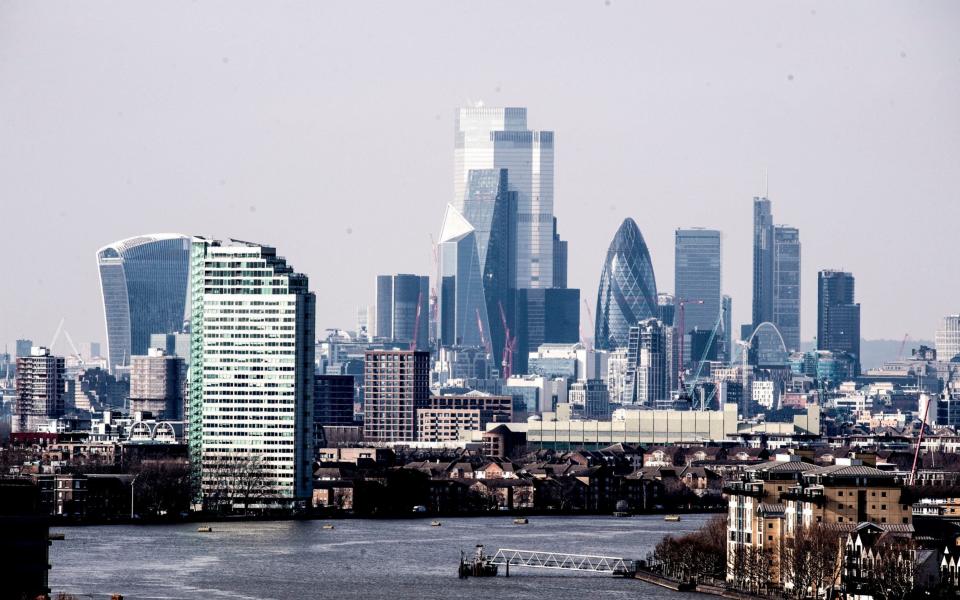Cap on bankers' bonuses could be lifted

The City minister has refused to rule out lifting a cap on bankers’ bonuses as part of plans to shake up the UK’s financial rules.
John Glen, economic secretary to the Treasury, said the Government was not considering removing the ceiling on payouts “right now” as he laid out plans to continue a post-Brexit overhaul of City rules.
The EU capped bankers’ bonuses at 100pc of salary, or double that with shareholder approval, in 2014. It followed concerns that bankers chasing huge payouts took too much risk before the 2008 financial crisis.
Banks are hoping to dodge a tax rise faced by other companies in the UK after the Chancellor Rishi Sunak pledged to review the 8pc surcharge paid by the industry because the impending increase in corporation tax from 19pc to 25pc would mean the overall tax rate for banks would be “too high”.
Mr Glen also told Bloomberg that the Government planned to widen its review of financial rules to include regulations on market structure, transparency rules and commodities.
It plans to consult with businesses on “detailed proposals for wider reform to the capital markets” in the summer, he said.
It follows a review of Britain’s fintech industry by Ron Kalifa, former boss of Worldpay, and a separate report on listing rules for companies trading their shares on UK stock exchanges by Lord Jonathan Hill, a former EU Commissioner for financial services.
The reports recommended changes to allow dual-class share structures so company founders can keep control of their firms after floating shares publicly. Lord Hill also proposed loosening rules to help London attract “blank cheque” companies, popular in New York, which raised a reported $83bn (£59.5bn) last year.
Mr Glen said that the Government would seek to avoid changes that would undermine the UK’s reputation for high regulatory standards, consistent with the Government’s stance that it wants to slash red tape without making markets less safe.
“There’s no question of us seeking to derive economic gains from deregulation,” he said.
His comments came as a new report revealed the UK is a more attractive destination for international businesses than it was before Brexit and confidence in the economy is rebounding.
The country is now the fourth most promising market for growth after overtaking India, PwC’s annual survey of chief executives found. Only the US, China and Germany ranked higher.
Chinese executives’ interest in the UK has increased sharply in other major economies. In China, 13pc of bosses surveyed placed it in their top three investment targets, up from only 3pc in 2019.
A quarter of Indian bosses also now rank the UK in their top three, up from 9.5pc when the survey was last run by the consultancy in autumn 2019.
Kevin Ellis, UK chairman of PwC, wrote in The Times: “The UK’s positive standing highlights what matters most to global business leaders.
“The EU trade deal drew to a close much of the uncertainty around Brexit. It’s hard to overestimate the importance of political certainty and stability when it comes to CEO decision making.”
Of the 5,050 chief executives who responded, 11pc named Britain as a top three growth target compared to 9pc last time around. The survey results are at odds with many predictions that the UK would struggle to attract investment after Brexit.
Within the UK, more than a quarter of bosses said they expected a “great” improvement in the global economy and were more bullish than their international counterparts on prospects for job growth as vaccines transform the fight against Covid-19.
More than half of British bosses predicted they would increase the number of people they employ this year compared to 44pc worldwide, according to the results, which were first reported by The Times.
Two in five British bosses are very confident their business’s prospects will improve, a 14pc rise since 2019.
Mr Ellis said that Rishi Sunak had made a bold decision by pledging to raise corporation tax while “the UK’s standing hangs in the balance”, but insisted the country remains competitive internationally.
He said: “Our tax regime forms part of the UK’s prospectus for business leaders and investors.
“In my experience, while the headline rate is important, investors look at tax systems in the round, the full package of reliefs and incentives, as well as its simplicity. In this respect the UK still has one of the most competitive tax systems in the world.”
The survey was conducted in January and February and gathered responses from chief executives in 100 countries, half of them running companies with revenues of more than $1bn (£720m).
